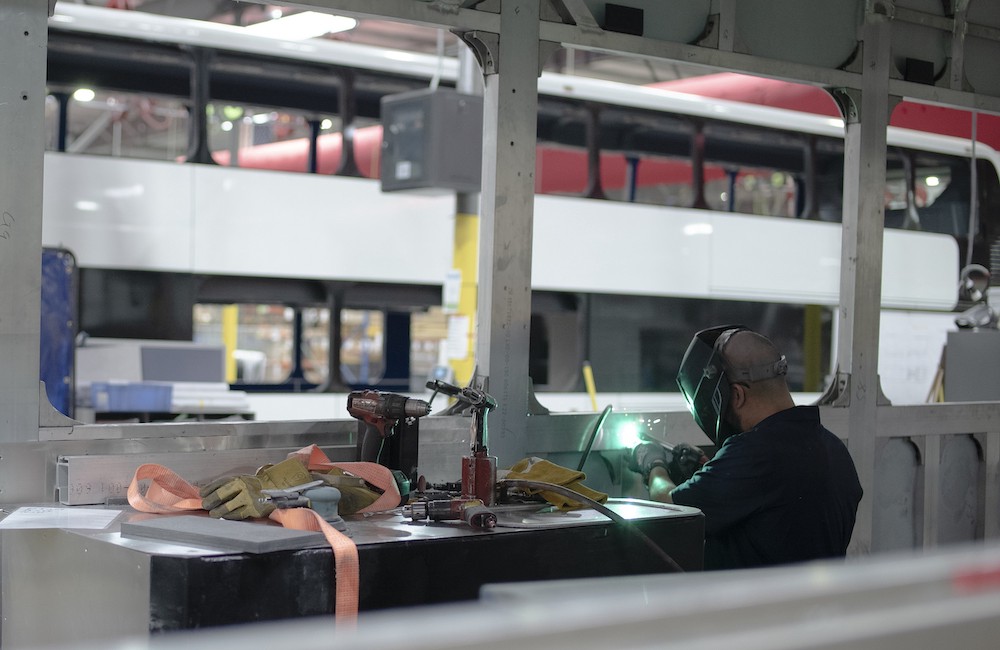The transition to a clean, equitable economy that works for everyone starts in California, as recent efforts across the state show.

California recently mandated the transition to zero emission transit buses with a good job creation provision, giving hope that the transition will benefit communities often left behind in the rush to adopt new technology: communities of color, women, veterans, and people returning home from prison.
The need for good jobs in California is more pressing than ever, especially within low-income communities and communities of color. For example, a much higher percentage of Latinx and African-Americans in California live in census tracts that are highly impacted by pollution, health disparities, and high rates of poverty and unemployment. California’s poverty rate also tops the nation when housing costs are factored into the cost of living.
That’s why the BlueGreen Alliance and Jobs to Move America (JMA) are working together in California to ensure that investments in zero emission bus manufacturing lead to economic opportunities and career pathways for disadvantaged workers.
With JMA and the BlueGreen Alliance’s involvement, California’s Department of General Services recently put forward a contract for zero emission buses that incentivized bidders to provide high-quality, good-paying jobs for workers building the buses. These buses will be purchased by transit agencies throughout the state.
This effort comes on the heels of the California Air Resources Board’s decision to mandate that all transit agencies in the state operate 100 percent zero emission transit buses by 2040, while investing in workforce training programs in manufacturing, infrastructure installation, and maintenance. A diverse set of community, labor, and environmental groups supported the Air Resource Board’s decision, including our groups, the United Steelworkers, Sierra Club, Earthjustice, Union of Concerned Scientists, American Lung Association, Coalition for Clean Air, Communications Workers of America District 9, the International Association of Sheet Metal, Air, Rail and Transportation Workers (SMART), SMART Western States Council, the International Brotherhood of Electrical Workers (IBEW) Local 11, IBEW Local 569, and IBEW LMCC.
The passage of this rule and the inclusion of jobs policy language in the DGS master contract is a huge win for many in our communities who — despite working hard for years — have been unable to benefit from the Silicon Valley tech boom and infrastructure investment. Not only will this transition to zero emission buses reduce greenhouse gas emissions, but it also has the potential to create and support tens of thousands of jobs in our state.
And it isn’t just zero emissions public transit buses that will reduce emissions and create high quality jobs. A grant opportunity from the California Energy Commission (CEC) for bulk purchasing of electric school buses is in the works. The BlueGreen Alliance, JMA, and the State Labor Federation’s Workforce and Economic Development unit worked together to secure good jobs and equity language in this taxpayer funded public investment as well. Now CEC’s efforts to eliminate school bus tailpipe emissions will also drive equitable economic development.
Moving to cleaner transit is one way we can reduce harmful air pollution and create good-paying jobs targeted to communities long excluded from pathways to middle-class jobs. This is a critical chance for communities of color, people returning home from prison, women, veterans, and others facing systemic barriers to employment.
California is leading the way in building a clean economy. Leaders in the state are finally realizing that the quality of jobs created by climate investments matters. Policy work in electric bus manufacturing provides just another example of California’s growing commitment to building a clean, fair, strong economy for all.
This article was co-authored by Jobs to Move America’s former California Director, Erika Thi Patterson, and BlueGreen Alliance’s West Coast Director JB Tengco.
